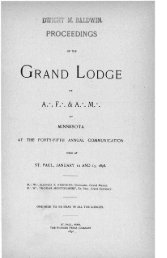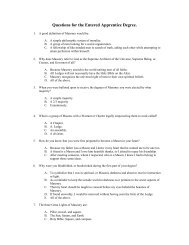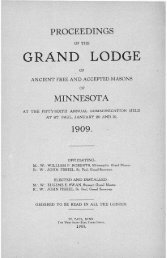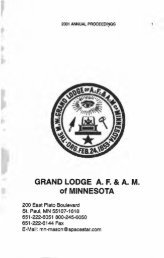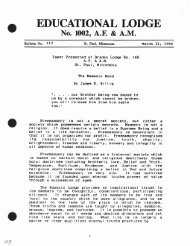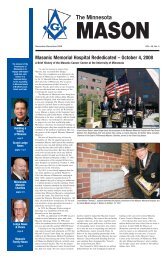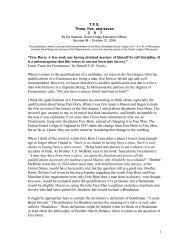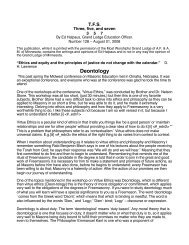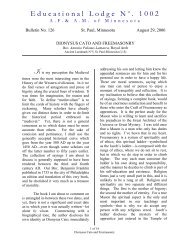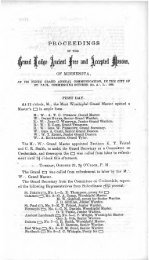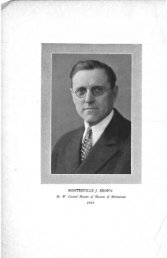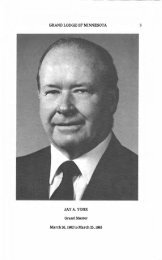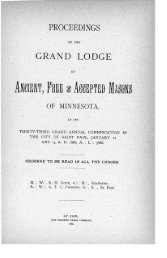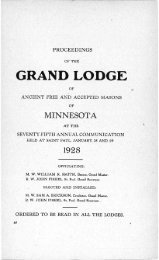Samuel & Phoebe Fraunces and General Washington - The Grand ...
Samuel & Phoebe Fraunces and General Washington - The Grand ...
Samuel & Phoebe Fraunces and General Washington - The Grand ...
You also want an ePaper? Increase the reach of your titles
YUMPU automatically turns print PDFs into web optimized ePapers that Google loves.
<strong>Samuel</strong> & <strong>Phoebe</strong> <strong>Fraunces</strong> <strong>and</strong> <strong>General</strong> <strong>Washington</strong><br />
By Ed Halpaus, MPS<br />
Gr<strong>and</strong> Lodge A.F. & A.M. of Minnesota, Gr<strong>and</strong> Lodge Education Officer<br />
First Published in the February 1, 2004 issue of Masonic Matters, a Masonic Education Newsletter.<br />
February is an active month. It is the month when we celebrate the birthdays of two U.S.<br />
Presidents, (<strong>Washington</strong> & Lincoln,) it is the month for lovers with Valentines Day; the<br />
day when all husb<strong>and</strong>s will get a card for the wife, <strong>and</strong> do something nice for her too, <strong>and</strong><br />
it is also Black History Month here in the U.S.<br />
Being that it is Black History month I would like to relate a couple of items I came across<br />
about blacks <strong>and</strong> their involvement with George <strong>Washington</strong>, <strong>and</strong> the American<br />
Revolutionary War.<br />
When <strong>General</strong> <strong>Washington</strong> crossed the Delaware River in December 1776 <strong>and</strong> had a<br />
successful victory over the enemy forces, there were two black soldiers with him. <strong>The</strong><br />
names of these men are Prince Whipple <strong>and</strong> Oliver Cromwell. Prince Whipple is depicted<br />
in the painting of <strong>Washington</strong> crossing the Delaware, (he is sitting in the seat next to<br />
where <strong>Washington</strong> is st<strong>and</strong>ing.)<br />
An interesting fact is that <strong>General</strong> <strong>Washington</strong>, at the end of the Revolutionary War,<br />
stressed that blacks who fought in the American Colonial Army in place of their owners,<br />
who were assigned to serve, would not return to slavery. Fighting on the American side<br />
established the validity for their freedom from bondage. i<br />
"As Mankind becomes more liberal, they will be more apt to allow that all those who conduct<br />
themselves as worthy members of the community are equally entitled to the protections of civil<br />
government. I hope ever to see America among the foremost nations of justice <strong>and</strong> liberality."<br />
Brother George <strong>Washington</strong><br />
It was on December 25, 1776 when Brother <strong>Washington</strong> had the decisive victory I<br />
alluded to above, but it might not have been possible if it had not been for the heroic<br />
observations <strong>and</strong> actions of a young girl earlier in the year.<br />
<strong>The</strong>re was a Tavern that has become somewhat famous, because that is where <strong>General</strong><br />
<strong>Washington</strong> gave his farewell address to his men at the end of America’s War for<br />
independence. <strong>The</strong> name of the place was <strong>Fraunces</strong> Tavern, <strong>and</strong> it was established in<br />
1762. ii But it had a different name back then. Its name at that time was the Queen<br />
Charlotte Inn named for the bride of King George III. It was located at the corner of Pearl<br />
<strong>and</strong> Broad Streets on the southern edge of Manhattan in New York City <strong>and</strong> it was owned<br />
<strong>and</strong> operated by <strong>Samuel</strong> <strong>Fraunces</strong>, thus the change in the name to <strong>Fraunces</strong> Tavern<br />
toward the end of America’s war for independence.<br />
<strong>Samuel</strong> <strong>Fraunces</strong> owned <strong>and</strong> operated his business with the help of his daughter <strong>Phoebe</strong><br />
for a total of twenty three years. This was a very popular business in 1768; the first New<br />
York Chamber of Commerce was created in <strong>Fraunces</strong>' Tavern. It was also the place<br />
where the Sons of Liberty gathered to mobilize popular sentiment for the coming
evolution against the British Crown. At a meeting of the Provincial Congress of New<br />
York, <strong>Samuel</strong> <strong>Fraunces</strong> befriended George <strong>Washington</strong>, who often dined at the tavern.<br />
<strong>Samuel</strong> <strong>Fraunces</strong>' young daughter, <strong>Phoebe</strong>, because she helped her father in the business<br />
also became acquainted with the <strong>General</strong>.<br />
I should point out that according to the book 10,000 Famous Freemasons; <strong>Samuel</strong><br />
<strong>Fraunces</strong> was a free black man of West Indian heritage who lived from 1722 to 1795, <strong>and</strong><br />
who was a Brother Mason being a member Holl<strong>and</strong> Lodge Number 8 in New York City.<br />
<strong>The</strong> history of the then emerging new country would have been quite different had it not<br />
been for <strong>Phoebe</strong> <strong>Fraunces</strong>. As the serving girl at George <strong>Washington</strong>'s headquarters at<br />
Richmond Hill, she is credited with foiling an attempt to assassinate the general with a<br />
dish of poisoned peas!<br />
<strong>Samuel</strong> <strong>Fraunces</strong> was an ardent patriot <strong>and</strong>, through his influence, his daughter <strong>Phoebe</strong><br />
shared his patriotism for this new country. <strong>Phoebe</strong> was always aware of what was going<br />
on in the tavern. Depending on how the struggle for independence was going, the ground<br />
where the Queen Charlotte Inn (<strong>Fraunces</strong> Tavern) was located was sometimes under<br />
British occupation <strong>and</strong> the <strong>Fraunces</strong>’ were virtually under house arrest, at other times<br />
when the Americans held that ground there were free, because they supported the<br />
Revolution.<br />
During these times there were many men from both sides of the war, who were both in<br />
<strong>and</strong> out of uniform, frequenting the tavern, <strong>and</strong> on one particular occasion <strong>Phoebe</strong><br />
overheard Thomas Hickey mention his intent to poison <strong>General</strong> <strong>Washington</strong>. One version<br />
of the story says that Hickey actually asked <strong>Phoebe</strong> to put the poison in the <strong>General</strong>s<br />
food, the other version is that she overheard him discussing this with another man, but in<br />
any event the plan was for Thomas Hickey, a member of <strong>Washington</strong>’s personal guard, to<br />
mix Paris Green, a poisonous green powder, with the peas for <strong>Washington</strong>’s personal<br />
plate. <strong>The</strong> British had bribed Hickey <strong>and</strong> he was prepared to follow through with the<br />
plan, but <strong>Phoebe</strong> told her father what she had overheard <strong>and</strong> together they both told<br />
<strong>General</strong> <strong>Washington</strong> <strong>and</strong> his dinner party about the plot.<br />
One of the men at the table took the peas, went into the backyard <strong>and</strong> scattered them to<br />
the chickens. Six chickens very quickly died. Hickey was arrested, tried, found guilty,<br />
<strong>and</strong> a few months later hanged before a crowd in New York City.<br />
By a special act of Congress a monetary award was given to Brother <strong>Samuel</strong> <strong>Fraunces</strong>,<br />
<strong>and</strong> when our Brother George <strong>Washington</strong> was inaugurated as President of the United<br />
States on April 13, 1789 the President appointed Brother <strong>Fraunces</strong> as the White House<br />
Steward.<br />
“In the final days of the struggle, the newly christened <strong>Fraunces</strong> Tavern served for ten<br />
days as the general's last residence - meaning that <strong>Washington</strong> did indeed sleep there!<br />
And it was in the Tavern's Long Room that he delivered the famous <strong>and</strong> tearful farewell
to the officers of the Continental Army on December 4th 1783, before returning to Mount<br />
Vernon.” iii<br />
So if your Lodge should have a short program about our Brother <strong>Washington</strong>, <strong>and</strong> the<br />
Brothers are enjoying some traditional Cherry Pie, maybe there will be a mention of<br />
some Black Americans, two of whom were a Mason <strong>and</strong> his Daughter, <strong>and</strong> how their<br />
efforts were of an immense help to our Brother <strong>and</strong> first President.<br />
"Labor to keep alive in your breast that little spark of celestial fire called conscience."<br />
Brother George <strong>Washington</strong><br />
i Dr. Edward Beasley<br />
ii A Brief History of <strong>Fraunces</strong> Tavern<br />
iii A brief History of <strong>Fraunces</strong> Tavern



